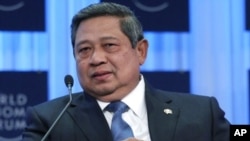Conflicts within the Cabinet of Indonesian President Susilo Bambang Yudhoyono have stifled efforts to reform the economy, crack down on corruption and promote pluralism and tolerance. This is the view of some political analysts, who say the president's strategy of forming his own "team of rivals" within his cabinet has weakened his ability to govern.
Many of Indonesian President Susilo Bambang Yudhoyono's supporters were disappointed but not surprised by his decision to keep his cabinet intact in spite of widespread speculation about a shake-up in his coalition. Political analysts say this decision reflects more than the president's cautious personality, it also exposes a weakness in the country's democratic system.
Although President Yudhoyono won a landslide re-election victory in 2009, with more than 60 percent of the vote, his Democratic party controls only 25 percent of the seats in parliament. To gain a working majority there, the president invited rival parties to join a grand coalition and awarded Cabinet positions to opposing party officials.
But instead of creating a unified government, political analysts says some Cabinet members and coalition partners are working to undermine the president. Political commentator and longtime supporter of President Yudhoyono Wimar Witoelar is particularly critical of the Minister of Religious Affairs Suryadharma Ali, a member of the Islamic Prosperous Justice Party. He says Ali's support for banning the Ahmadiyah sect contradicts the president's calls for tolerance. Many Muslims consider Ahmadiyah to be against Islam because its members do not believe Mohammad was the last prophet.
"The minister of religion is not only stifling the president's initiative, but he is subverting the desire of the Islam majority which is liberal, which is moderate, and some of them are outright liberal, and being pluralistic - a tradition which we prize most of all besides our democracy," said Suryadharma Ali.
Muhammad Qodari, an analyst with the political polling organization Indo Barometer agrees. He says President Yudhoyono miscalculated by assuming he could ensure political allegiance by giving influential Cabinet positions to rival parties.
"I think one mistake by Yudhoyono is that he always relate the support from his rival parties in parliament to the number of ministers at his own Cabinet," said Muhammad Qodari. "I imagine that Yudhoyono would have done much better if he pick his minister mostly based on their competence and professional background."
Even if some rival party members in the Cabinet are loyal to the president, Witoelar says their counterparts in parliament have hampered the president's efforts to crack down on corruption and reform the economy.
The president and his party have also been tainted by charges of corruption. Investigations into whether Vice President Boediono and then Finance Minister Sri Mulyani were involved in bailing out the Century Bank, in return for campaign donations, dragged on for months. Although the outcome was inconclusive, the president's legislative agenda was put on hold and, in the end, Mulyani resigned to become managing director of the World Bank.
Witoelar says, apart from differing political agendas and personality conflicts, there is a structural problem with the hybrid democratic system in Indonesia that includes both a president and parliament, with no clear majority party.
"We have to preserve both the presidency and the democratic party, but maybe define the rules of play for a multi-party system," said Witoelar. "And, the choice whether this is to be a presidential system like the American system or a parliamentary system like the European, French, British system. Now we are having the worst of both."
Qodari supports a proposed reform to require that parties win at least five percent of the national vote to gain a seat in parliament.
"I would say Indonesia would have a better situation, a simpler political constellation, if let's say there are only five political parties at the parliament and this should be implemented not only at the national level, but also at the local level," said Qodari.
For at least for the remainder of the president's term, he expects the combination of a contentious parliament and an overly cautious president will ensure a slow pace of change.




